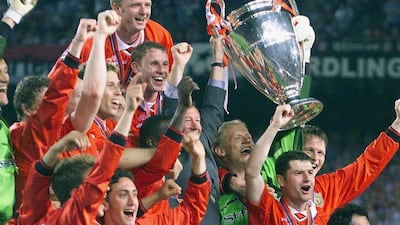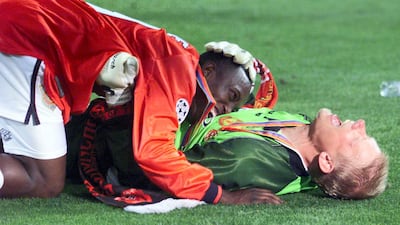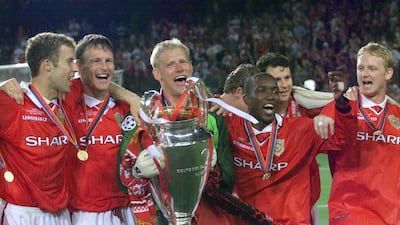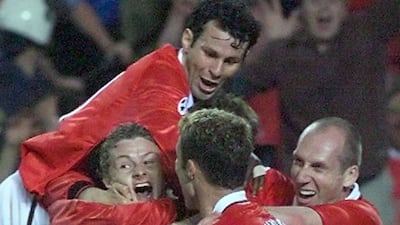The trip to Barcelona 20 years ago remains the largest ever away following to another country in European football. Catalan authorities estimated at least 55,000 Manchester United fans gathered in Barcelona 20 years ago on May 26 1999 for the Uefa Champions League final against Bayern Munich.
It is highly unlikely that any team will take as many away fans to a game on the European continent again.
United received a vast 38,000 allocation, with the most popular price for those tickets just £12 (Dh56), less than the cost of an equivalent seat inside Old Trafford in 1999.
Camp Nou’s capacity allowed for the huge allocations for both clubs, but they were fair allocations too.
Over 41 per cent of the tickets – themselves a work of art using a painting from Catalan artist Joan Miro, went to card carrying fans of either club, just 18 per cent (or 14,000) went to people who were not including sponsors.
United and Bayern fans got their hands on most of those, too. It is a curious fact that Camp Nou has not staged the Champions League final since.
In Madrid on June 1, Liverpool and Spurs will receive 16,613 tickets, only 24 per cent each of the capacity of Atletico Madrid’s Estadio Metropolitano.
Over 50 per cent of tickets will go to people who are not fans of either team. Uefa’s argument is that neutrals should be able to enjoy the showcase event, but many tickets aimed for neutrals end up on the black market at hugely inflated prices.
Even the 38,000 tickets allocated to United could not come close to sating demand for their first European Cup final since 1968 – and a chance to become the first English club to win the League, FA Cup and the Champions League - something that has not been done since.
Unofficially, many United fans did whatever they could to get tickets, which were touted for £600 outside Europe’s biggest stadium pre-match.
The cheapest black market tickets for the game in Madrid next week are going for €3,500.
All the players and club staff were badgered for tickets.
“All of my mates and family went to Barcelona,” said United midfielder Nicky Butt. “I must have sorted 50 tickets out for the final. I remember having to write out fifty names and addresses of all the people who wanted tickets. To this day I’ve never watched the game. I’d love to see it and all the build up.”
Every travelling fan has their story from that trip, the pictures look aged, the fashions bygone. Why were photos so blurry? Why did so many fans wear jeans and shirts which were far too big for them?
Too many United fans paid for tickets they did not receive from agencies who were unable to deliver what they had promised. The two late goals that gave United a famous win were the highlight, but there were plenty of others and the statistics were staggering.
Hotels were full within a two-hour drive of Barcelona, from Blanes and Lloret in the north to Salou in the south.
Fans who had booked into the Melia in Sitges 40 kilometres south of Barcelona were delighted to find out that they were in the United’s players’ hotel.
Among the residents in the town in 1999 were Jose Mourinho and Louis van Gaal.
The players mixed with fans, the suspended Roy Keane and Paul Scholes more than others. Keane was rooming with compatriot Denis Irwin and tried not to wake him when he returned to their room in the early hours.
Angst ridden Swedish winger Jesper Blomqvist went into his room and “and wrote a list to coach myself for the biggest game of his career.
It said: "You can do it…You are faster than the rest…You are in good shape…. I had done this before to self-motivate. Now I was using it to conquer my nerves.”
Blomqvist had known for three weeks that he would play in Barcelona because of suspensions to Keane and Scholes, hence the nerves.
Barcelona’s El Prat airport reported its busiest ever day – as did those in Reus to the south and Girona to the north. The figures have never been surpassed. Even now, 20 years on, the Bugui restaurant close to Camp Nou on Diagonal took their record takings that day.
The owner keeps a picture of the United fans in his establishment that day and tells a story of his employees unable to keep up with the demand.
Barcelona was the perfect location for the game. It wasn’t hard to reach like Baku, venue for Wednesday's Europa League final between Arsenal and Chelsea - though there are thousands of United fans who would have delighted in the adventure of trying to reach Azerbaijan.
Camp Nou’s huge capacity helped, as did the relatively ease of access for travelling fans all over Europe. Bavaria was 1,300 kilometres and 14 hours by road, Manchester 1,800 kilometres and 20 hours of driving.
There were a dozen airports within a five-hour drive of Barcelona, trains too – and ferries from the Balearic Islands.
One group of friends who had travelled home and away all that season from Lodz to Turin in the semi-finals, took a cheap flight to Biarritz in France, then drove via Toulouse, Carcassone, Perpignan and Girona towards Barcelona.
This writer and his group had no accommodation and would find no accommodation. Bed for the night would be the car park beneath the seafront Hotel Arts, which United had reserved for the night of the game in the hope of having a post match party there.
The weather was warm and sunny, prices were cheapo and no visas were required for visitors. Barcelona was used to visitors. It had successfully staged the 1992 Olympics, witnessed 8,000 United fans in 1994 and was about to overtake Paris as the most popular weekend break destination for Brits.
Nothing, however, prepared the conservative Catalans from the Manchester invasion of May 26.
Inside Camp Nou, the great Catalan soprano Montserrat Caballe sang ‘Barcelona’ the anthem of the 1992 Olympics which she had written with Freddie Mercury in Barcelona’s Ritz hotel.
The sun dipped behind the towering tiers of the 98,600 capacity stadium and the mountain of Tibidabo.
And then the game. A poor game, one Bayern dominated. Until those late goals in stoppage time that gave United a 2-1 triumph.
Teddy Sheringham got the first. A decade later, this writer asked him what he recalled: “I ran away towards the United fans behind the goal. I looked at the linesman to make sure I was onside.
"I knew I was, but I just wanted to make sure. Some of the Bayern players had their arms in the air for offside. No chance.”
Ole Gunnar Solskjaer’s winner would follow moments later from a corner.
“Ninety-nine times out of 100, that ball would go into the hands of (Oliver) Kahn or on the head of the guy on the line,” said the Norwegian. “I cannot remember what I was thinking. I was just sliding, celebrating.
"Afterwards, I couldn’t understand the impact of it all. You are in the middle of it and you are so focused. You never think about the consequences it will have for so many people.”
Sheringham added “Three or four of the Bayern Munich players were on the floor. I saw one punching the pitch. He couldn’t believe what had happened. Neither could I.”
Keane had been suspended for the match and could watch as a spectator, but he still remembers it vividly.
“I doubt if we’ll ever see three minutes of football like that again,” Keane said.
“In the end it went to the team that wanted it most. Heart won the day. I had played in twelve of the European games, yet I never felt so drained as I did at the end of those ninety-three minutes in Barcelona.”
Keane was reluctant to celebrate after, but the fans demanded it. Those fans were still inside the stadium, spread over three vast tiers, for hours after.
Then they flooded the metro system to get back towards the centre. Fans called home and many, unaware of the vast roaming charges of using their mobiles abroad, were hit with huge mobile phone bills the following month.
After seeing huge queues around the metro and waiting for an age on the a packed platform with no sign of a train, this writer's group decided to walk from Camp Nou to the Port Olimpic. What on earth were we thinking? It’s nine kilometres.
After witnessing the spectacle of the centre of their city being taken over, the Catalan daily La Vanguardia wrote of United fans: "They are ugly, but they are good people." The cheek.
Hundreds of millions watched the game on television globally.
“It was nearly 20 million and that doesn’t happen now,” said commentator Clive Tyldesley of the UK audience. “A big World Cup game might get 16 million, but never for a club game. BT Sport would have around two million for a Champions League final.”
After a post match party where the players barely slept, they returned to Manchester, Ryan Giggs said this week: “My favourite moment of the treble wasn’t anything to do with football.
“It wasn’t that amazing last couple of minutes in the Nou Camp, when we won the league against Tottenham or the FA Cup final against Newcastle.
"It was the moment we turned down Deansgate on the open topped bus and all I could see was a sea of red. Growing up in Manchester and seeing the joy on people’s faces, people were hanging out of offices, climbing lamp posts, that was my favourite moment.”
A year later, I interviewed Solskjaer. A longstanding Cockney Red asked if I could get him a picture of his goal in Barcelona signed together with the message ‘Who put the ball in the Germans’ net?’
Solskjaer smiled at the request, but said it was disrespectful to write that. Instead, he wrote, ‘To John, I hope you enjoyed this moment as much as me.’
He did. All United fans did. And how could we not?








